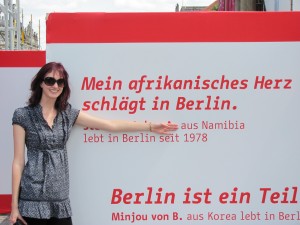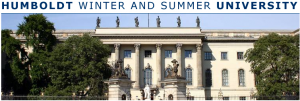
During the June / July holidays Annelien Robberts attended a summer school in Berlin. Here is her story:
Pre-departure:
It was the first time I had to organise a trip abroad myself. Not being familiar with all the visa systems, I ended up having to buy two flight tickets. My original flight booking was to Tegel (Berlin) via London. I only had a Schengen Visa which is valid for Europe only. Thus, I came at O.R. Tambo and they refused to let me go through. Luckily both my parents were with me, so with three debit cards we were able to buy a ticket via Amsterdam. The UK requires another visa, which I should have read on my purchased ticket, but my busy exam timetable restricted my time for planning my trip overseas. I reckoned the sooner I bought my ticket, the cheaper it would be, and thus this little detail of another visa escaped me.
As what concerns applying for the visa, it is not complicated at all. I made an appointment with the consulate as soon as possible after booking my flight. This can be telephonically done, or even online. It is important to have all the necessary documentation, such as your passport, your invitation letter from the university abroad, and a letter from your own university declaring that you will return to South Africa to finish your studies. You also need your flight ticket and bank statements with a budget of at least R400 per day. The bank statements must be printed at the bank with its original stamp.
Since I have a friend in Germany, I trusted her opinion about the hot weather in Berlin. As a Stellenbosch student I am supposed to know that weather is always unpredictable despite the weather forecasts. Pack a variety of clothes, such as experiencing four seasons in one day. Do not forget your sunglasses, sunscreen, swimsuit, umbrella and a warm jacket. Keeping in mind that you would possibly bring back some souvenirs and presents, it is advisable not to go over the given weight restrictions for baggage. I only took one jersey and one long jean, which I really regretted when it rained ceaselessly for a couple of days. However, I was really thankful for my summer clothing during warm humid days.
Furthermore, I made sure that all my work of university, such as reading reports, was submitted, my articles for Pallas (our residence’s newspaper) were written and I was able to focus my complete creativity on my personal blog of my journey to the strange.
I was entirely unsure of what to expect form forty international students, but the international office of Humboldt made the culture shock easier by sending information regarding the train systems and directions we were supposed to take to our apartments. The information on the apartments was elaborate, and some information on the university and surrounding places where you can eat for reasonable prices were also given.
Each person was invited to join the university’s Facebook page. As for Stellenbosch University, Jan Willem van der Westhuizen sent us the link of blogs of previous South African students’ experiences of their studies abroad. The Stellenbosch participants chosen for the Humboldt courses were also given the opportunity to make contact.
After a lot of stress and drama due to my visa, I finally made it to Germany on time and in one piece!
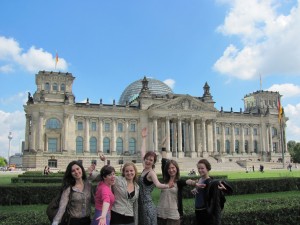
At the Summer School:
When I arrived at the apartments, I was welcomed by an American student studying German. I received the course layout, some historical information about the university and a map of campus and the train systems. It is extremely important to understand the metro systems in order to make travelling in Berlin a lot more pleasant.
I also met my roommate from the USA and she introduced me to some of her other friends who she met on a previous summer course in Berlin. Thus, making friends was no problem and I felt right at home. On the first day of class, we all went together to university which reduced the stress levels of getting off at the wrong station or taking the wrong train. The only negative aspect was that the apartments were far from where we had our classes, causing some inconvenience when I quickly needed something from home, but we would only have an hour off sometimes between class and the next planned activity.
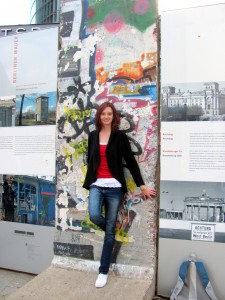
The university’s welcoming programme was very relaxed. There were some short introductory speeches and then we played games in order to get to know each other. It was interesting to have 40 different people from 20 different countries in one classroom. Of course this is the ultimate chance of making friends and not spending your month in Berlin alone.
During class we were introduced to different themes, such as the German culture which is a broad theme, including the German (with the focus on Berlin habitants) humour, different German dialects, the differences between the East and the West (physically and mentally), and of course the multi-cultures. This theme is in some sense dependent on the German history, which we also discussed in detail. Furthermore, we touched themes such as art, music, theatre and politics.
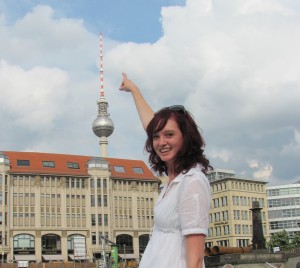
Even though politics is not a big interest of mine, the course produced a lot of fun. After watching a DVD on German politicians, we divided into groups and made up our own political parties. I had the chance to show my drama skills by reading our party’s mission like a German politician, while others could show their art skills by designing the poster. We also visited the Reichstag, the German parliament. If politics is not of great interest, one can still admire the architecture, the modern art and the history of the building.
Then there is the language section of the course. We never focussed too much on language out of fear that the students might lose interest. Of course the chance to develop your communication skills is always there by ordering food at a restaurant, asking for directions and even having interviews with people, which was sometimes given as unofficial homework assignments. All the excursions planned by Humboldt were also presented in German.
Before we visited the Stasi prison we did some necessary vocabulary which helped us to understand the German guide. It really helps to concentrate during class! Our guide was a prisoner himself, which made the experience more intense. For our two theatre excursions we also learned necessary vocabulary, and we read extracts from the plays to make it easier to follow and comprehend.
Not all the excursions were ‘academic’, because we also had an international picnic where everyone had to bring something typical from his or her country. At the end of the course we had a little party with all the staff from the international office. They are extremely warm people, very friendly and open to talk to.
The experience of studying a foreign language and culture became 4-dimentional to me, which is obviously not possible in Stellenbosch when it comes to modern foreign languages. Although, I would recommend a more pro-active environment concerning international students coming to South Africa, because it is an opportunity to develop language and to make new friends that we should not dismiss as unimportant. In some sense the German department has already mastered this, because they organise events for local students to meet international students and practice their communication skills. I hope to see the French department becoming more involved with students from France or other francophone countries in the near future.
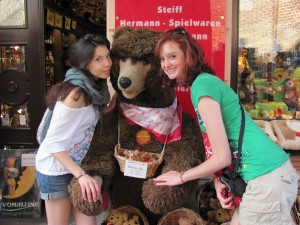
Back in South Africa
After returning to Stellenbosch, I was much more aware of the language people speak around me. There is a surprising number of English students when walking to the Arts building! I also noticed some German people in the Neelsie. Unfortunately they seemed to be in a hurry, otherwise I would definitely have taken the opportunity to talk to them, make them feel welcome and improve my German conversation skills. That is another thing that I learned in Berlin: I am now able to approach a stranger easily and start talking to him or her.
It took me a while to adapt to the 2-dimentional ‘learning from books environment’ again. The experience in Berlin was vivid and real, even though we learned grammar and read articles, we still had the opportunity to get out of the classroom and experience the culture ourselves. For the first time I learned to appreciate the activities by the German society like Matieka (German carnival) and ‘Stammtisch’ organised by the German department where students can meet German Namibians and pure Germans. It would be fabulous if the French department could start something like this. I do not have Xhosa, but just imagine an Afri-Xhosa evening! Is this not a perfect opportunity to let students develop respect for each other’s cultures? Xhosa is a compulsory subject for many students, so it might as well be positively promoted. Xhosa people can also speak Afrikaans and/or English, which would mean that there can be perfect interaction between cultures. Maybe there already are such opportunities available, but the marketing does not reach the entire campus.
It was as if there was a bigger respect among students from 20 different countries than students in one single country, namely South African with its variety of cultures. In South Africa we tend to take other cultures for granted. I realise that everybody’s interest in culture differs, but awareness and respect cost nothing. Instead, an entire nation can benefit from this. Sure, it is a goal that every country would like to achieve, but we have to start somewhere.
Stellenbosch’s culture is amazing to be a part of and I am very thankful to be here. University students, as the leaders of tomorrow, should start working on intercultural aspects as soon as possible. I greatly admire the youth ambassadors from Taiwan who came to Stellenbosch to give students a taste of the Taiwanese culture (Ambassadors visit Campus, Die Matie: 27 Julie 2011).
Furthermore, South Africa has eleven official languages, but what do we as South Africans do to promote each language? Can we truly say South Africa has 11 official languages if only Afrikaans and English are officially taught and spoken? The language policy of a country is not necessarily about the language, but rather about the culture and the association we have with the language and its speakers. Even though it is impossible to learn eleven different languages, it is not impossible to get to know as many cultures. Culture is something that dates from ancient times and by studying them we are enabled to learn so much about ourselves.
As what concerns a longer exchange programme, I would definitely take the opportunity without hesitation. With international exchange programmes the doors to other countries and cultures are opened. It was shocking how little people knew about Africa and specifically South Africa, since it is such a part of me that I almost take it for granted. I would definitely encourage an ambassador’s programme of some kind for any country, and especially for universities, since students, being on the crane of youth, have more mobility and no fixed responsibilities such as families or work obligations.
I would like to use this opportunity to thank the University of Stellenbosch as well as Humboldt Universität zu Berlin for broadening my horizons and giving me the key to a future with the things I am most passionate about – languages, cultures, people and countries. It is amazing how only one month abroad was a life-altering experience.
